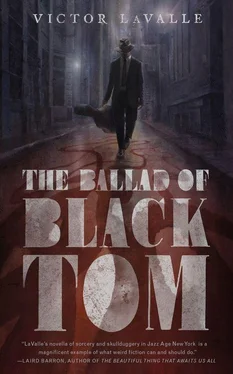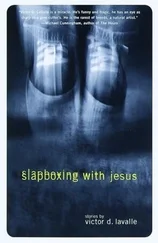“My name is Robert Suydam,” the man said. Then waited, as if the name alone should make Tommy Tester bow. “I am having a party at my home. You will play for my guests. Such dusky tunes will suit the mood.”
“You want me to sing?” Tommy asked. “You want to pay me to sing?”
“Come to my home in three nights.”
Robert Suydam pointed toward Martense Street. The old man lived there in a mansion hidden within a disorder of trees. He promised Tommy five hundred dollars for the job. Otis Tester had never made more than nine hundred in a year. Suydam took out a billfold and handed Tommy one hundred dollars. All ten-dollar bills.
“A retainer,” Suydam said.
Tommy set the guitar flat in its case and accepted the bills, turning them over. 1923 bills. Andrew Jackson appeared on the front. The image of Old Hickory didn’t look directly at Tommy, but glanced aside as if catching sight of something just over Tommy Tester’s right shoulder.
“When you arrive at the house, you must say one word and only this word to gain entrance.”
Tommy stopped counting the money, folded it over twice, and slipped it into the inner pocket of his jacket.
“I can’t promise what will happen if you forget it,” Suydam said, then paused to watch Tommy, assessing him.
“Ashmodai,” Suydam said. “That is the word. Let me hear you say it.”
“Ashmodai,” Tommy repeated.
Robert Suydam tapped the cane on the pavement twice and walked away. Tommy watched him go for three blocks before he picked up his hat and put it on. He clicked the guitar case shut. But before Tommy Tester took even one step toward the train station, he got gripped, hard, on the back of the neck.
Two white men appeared. One was tall and thin, the other tall and wide. Together they resembled the number 10 . The wide one kept his hand on Tommy’s neck. He knew this one was a cop, or had been once. Up in Harlem they called this grip John’s Handshake. The thin one stayed two paces back.
The surprise of it all caused Tommy to forget the pose of deference he’d normally adopt when cops stopped him. Instead he acted like himself, his father’s son, a kid from Harlem, a proud man who didn’t take kindly to being given shit.
“You’re coming on a little strong,” he told the wide one.
“And you’re far from home,” the wide one replied.
“You don’t know where I live,” Tommy snapped back.
The wide one reached into Tommy’s coat and removed the ten-dollar bills. “We saw you take these from the old man,” he began. “That old man is part of an ongoing investigation, so this is evidence.”
He slipped the bills into his slacks and watched Tommy to gauge his reaction.
“Police business,” Tommy said coolly, and stopped thinking that the money had ever been his.
The wide one pointed at the thin one. “He’s police. I’m private.”
Tommy looked from the private detective to the cop. Tall and thin and lantern-jawed, his eyes dispassionate and surveying. “Malone,” he finally offered. “And this is. ”
The wide one cut him off. “He doesn’t need my name. He didn’t need yours, either.”
Malone looked exasperated. This strong-arm routine didn’t seem like his style. Tommy Tester read both men quickly. The private detective had the bearing of a brute while the other one, Malone, appeared too sensitive for a cop’s job. Tommy considered that he’d stayed a few paces back to keep away from the private dick, not Tommy.
“What’s your business with Mr. Suydam?” the private detective asked. He pulled Tommy’s hat off and looked inside as if there might be more money.
“He liked my music,” Tommy said. Then, calm enough now to remember the situation, he added another word quickly. “Sir.”
“I heard your voice,” the private detective said. “Nobody could enjoy that.”
Tommy Tester would’ve liked to argue the point, but even a corrupt, violent brute could be right sometimes. Robert Suydam wasn’t paying five hundred dollars for Tommy’s voice. For what, then?
“Now me and Detective Malone are going to keep strolling with Mr. Suydam, keeping him safe. And you’re going to go back home, isn’t that right? Where’s home?”
“Harlem,” Tommy offered. “Sir.”
“Of course it is,” Malone said quietly.
“Home to Harlem, then,” the private detective added. He set the hat back on Tommy’s head and gave Malone a quick, derisive glance. He turned in the direction where the old man had gone, and only then did Malone step any closer to Tommy. Standing this near, Tommy could sense a kind of sadness in the gaunt officer. His eyes suggested a man disappointed with the world.
Tommy waited before reaching down for his guitar case. No sudden moves in front of even a sullen cop. Just because Malone wasn’t as rough as the private detective didn’t mean he was gentle.
“Why did he give you that money?” Malone asked. “Why really?”
He asked, but seemed to doubt an honest answer would come. Instead there was a set to his lips, and a narrowness in his gaze, that suggested he was probing for an answer to some other question. Tommy worried he’d mention the performance at Suydam’s home in three nights. If they weren’t happy about Tommy talking with Suydam on the street, how would they act upon learning he planned to visit the old man’s home? Tommy lost one hundred dollars to the private detective, but he was damned if he’d give up the promise of four hundred dollars more. He decided to play a role that always worked on whites. The Clueless Negro.
“I cain’t says, suh,” Tommy began. “I’s just a simple geetar man.”
Malone came close to smiling for the first time. “You’re not simple,” he said.
Tommy watched Malone walk off to catch up with the private detective. He looked over his shoulder. “And you’re right to stay out of Queens,” Malone said. “That old woman isn’t happy with what you did to her book!”
Malone walked off and Tommy Tester remained there, feeling exposed— seen —in a way he’d never experienced.
“You’re a cop,” Tommy called. “Can’t you protect me?”
Malone looked back once more. “Guns and badges don’t scare everyone.”
Tommy’s best friend, Buckeye, arrived in Harlem in 1920 when he was sixteen years old. At fourteen he’d left the tiny Caribbean island of Montserrat to work on the Panama Canal, and from Panama made his way to the United States, to Harlem. He arrived expecting to do the same work as he’d done on the canal — construction — but soon found out what Otis Tester had long known: Negroes had no protection. Buckeye broke an ankle at the age of seventeen and found himself out of day labor for two months. When he was ready to return, the job had been filled, and besides that, the ankle never healed well. He couldn’t be on it for long hours, couldn’t tote much weight without it giving out. Soon he found his way to Madame St. Clair and her famous numbers game. She hired him because she needed men from the Caribbean, who knew and would be trusted by the recent West Indian immigrants. Madame St. Clair evolved in changing times, and because of this she thrived. The regular kickbacks to local police also helped. Buckeye met Tommy Tester in this milieu. Tommy played a club where Buckeye made business. One evening Buckeye sidled next to Tommy at the bar and asked where he’d learned to sing so badly. Did he take lessons or was it a natural gift? They became fast friends.
Now Tommy Tester led his father out of their building and down the block. He’d returned home from the encounter with Robert Suydam, with Malone and the private detective, and felt himself in need of a night out. It took time to convince Otis to step out. Otis never left the apartment, hardly left his bedroom. He’d become like a dog gone into the dark so he could die alone, but Tommy had different plans. Or maybe he needed his father too much to let him go easily.
Читать дальше












